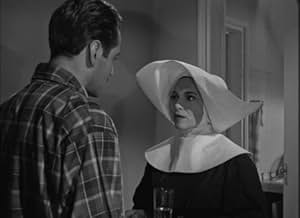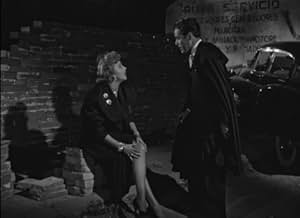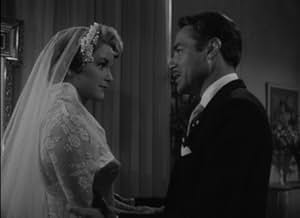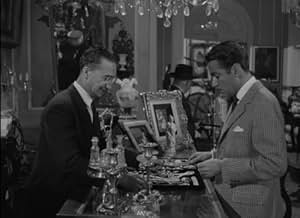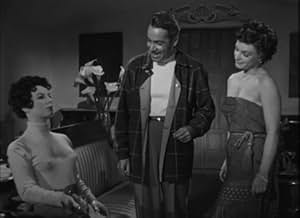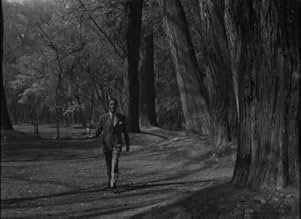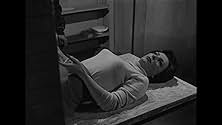La vie criminelle d'Archibald de la Cruz
Titre original : Ensayo de un crimen
- 1955
- Tous publics
- 1h 29min
NOTE IMDb
7,6/10
6,2 k
MA NOTE
Un épisode de son enfance associe à jamais léros dArchibald au désir de meurtre, ce qui est tout de même une complication dans la vraie vie Désirant Lavinia une modèle pour artistes, il brûl... Tout lireUn épisode de son enfance associe à jamais léros dArchibald au désir de meurtre, ce qui est tout de même une complication dans la vraie vie Désirant Lavinia une modèle pour artistes, il brûlera un mannequin la figurant et se libèrera de sa malédiction. [255]Un épisode de son enfance associe à jamais léros dArchibald au désir de meurtre, ce qui est tout de même une complication dans la vraie vie Désirant Lavinia une modèle pour artistes, il brûlera un mannequin la figurant et se libèrera de sa malédiction. [255]
- Réalisation
- Scénario
- Casting principal
- Récompenses
- 1 victoire et 8 nominations au total
Ariadne Welter
- Carlota Cervantes
- (as Ariadna Welter)
José María Linares-Rivas
- Willy Corduran
- (as J.M. Linares Rivas)
Enrique Díaz Indiano
- Señor de la Cruz
- (as Enrique Indiano)
Carlos Martínez Baena
- Padre Alonso
- (as Carlos M. Baena)
Armando Acosta
- Hombre casa juegos
- (non crédité)
Eduardo Alcaraz
- Gordo Azuara
- (non crédité)
Janet Alcoriza
- Turista de Oklahoma
- (non crédité)
Avis à la une
I have often cited this as my favourite Bunuel film and one of my favourite films of all. Watching it again after a period of some years, I am surprised that it seems so light and amusing instead of dark and dangerous. I suppose this is partly because when first seen the misogyny, the gleefulness at the prospect of killing a woman, is so shocking, that we notice less the playfulness. Whereas on a subsequent viewing we are less affected, having some idea how things pan out. Is this the only Bunuel film with a seemingly happy ending? There are still, of course, many shocking moments, like the bloody/sexy death of the woman looking after him as a child, the whole business concerning the mannequins (that seems burned in my memory for ever) and the most surprising early death of the nun/nurse. Maybe it's partly that when I watched this in my youth I rightly saw it as stunningly original and displaying conduct contrary to that shown elsewhere, whereas now the old cynic in me has been exposed to much more and is smiling throughout with barely a pause for a gasp. Always going to be fun to watch though.
Handsome and well-heeled Archibaldo has been convinced from boyhood that he possesses a music box that has the power to kill. He embarks upon a career as a serial murderer in which his intended victims are ravishing looking females but Fate continually thwarts his lethal intentions and his murders never get past the fantasy stage.
The most notorious scene in the film and one of which only this director is capable, is where Archibaldo consigns to the flames of a kiln a wax model of one of his potential victims who has slipped through his grasp. This macabre episode has acquired a tragically ironic overtone as the woman who has modelled for the dummy is played by Miroslava Stern who was cremated shortly after filming completed, having taken her own life. Bunuel was of course to employ a 'prosthetic limb' to great effect in 'Tristana'.
Working within the budgetary limitations of Mexican cinema, director Luis Bunuel has fashioned a stylish, sophisticated and technically polished piece that contains some delicious performances and bizarre Bunuelian moments that linger long in the memory.
Although condemned by circumstances to being innocent of murder Archibaldo still feels the need to 'confess' to the police. He is politely dismissed by a detective with the words:"thinking about murdering someone does not constitute a crime." This will strike a chord with most of us I am sure!
The most notorious scene in the film and one of which only this director is capable, is where Archibaldo consigns to the flames of a kiln a wax model of one of his potential victims who has slipped through his grasp. This macabre episode has acquired a tragically ironic overtone as the woman who has modelled for the dummy is played by Miroslava Stern who was cremated shortly after filming completed, having taken her own life. Bunuel was of course to employ a 'prosthetic limb' to great effect in 'Tristana'.
Working within the budgetary limitations of Mexican cinema, director Luis Bunuel has fashioned a stylish, sophisticated and technically polished piece that contains some delicious performances and bizarre Bunuelian moments that linger long in the memory.
Although condemned by circumstances to being innocent of murder Archibaldo still feels the need to 'confess' to the police. He is politely dismissed by a detective with the words:"thinking about murdering someone does not constitute a crime." This will strike a chord with most of us I am sure!
10zetes
Perhaps my favorite of Buñuel's Mexican years. As a child, Archibaldo de la Cruz willed the death of his young, sexy nanny through the device of a magical music box. As an adult, he finds this box at a pawn shop, and it awakens the exciting feelings he had as he stood over the corpse of his nanny checking out her exposed thigh. He decides to become a serial killer, but it never quite works out that way. Every person he sets out to kill ends up being murdered by another's hand. Actually, I shouldn't say "person," as Archibaldo's violent emotions only arise towards women. There is some heavy Catholic symbology to the picture, and the violence towards women obviously arises from the twisted mores of Catholicism. His first intended victim as an adult, for example, is a brazen tramp who openly expresses her wish to seduce him to get back at her husband. Buñuel had perhaps the most impeccable sense for creating finales, and the one here is as odd and remarkable as any other. Watch the two actions Archibaldo performs with his cane. I'm not 100% sure what they signify, but I know that must be of the utmost importance. Ensayo de un crimen should be watched back to back with Buñuel's 1953 film, Él, also about a man being driven insane over his wife because of his strict religious beliefs. 10/10.
Criminal Life of Archibaldo de la Cruz, The (1955)
** 1/2 (out of 4)
Luis Bunuel film that sounds more interesting than it turns out to be. As a young child, Archibaldo is told of a magical magic box that when turned on will kill. As an adult, Archibaldo comes across this box again and this times plans to use it to help him become a serial killer. There's a lot of black humor scattered throughout the film but very little of it made me laugh. The opening segments bashing the rich were funny but the film slowly falls apart in the middle and never regains any speed. The story is a very good one but the director does very little with it, which is a shame because this should have been a whole lot better.
** 1/2 (out of 4)
Luis Bunuel film that sounds more interesting than it turns out to be. As a young child, Archibaldo is told of a magical magic box that when turned on will kill. As an adult, Archibaldo comes across this box again and this times plans to use it to help him become a serial killer. There's a lot of black humor scattered throughout the film but very little of it made me laugh. The opening segments bashing the rich were funny but the film slowly falls apart in the middle and never regains any speed. The story is a very good one but the director does very little with it, which is a shame because this should have been a whole lot better.
Yet another perfectly constructed story by Buñuel, but this time the pace of the film just doesn't feel right. As a viewer i usually have found myself trapped between the unceasing spanish dialogues. The portray of a mentally ill killer should've been more distant from the common reality, if not within the dialogues, then through the usage of scenery and theatrical production, which in this case was monotone and non-corresponding to a thrilling-tempting view
Le saviez-vous
- AnecdotesThe movie was shot in the middle of a big economic crisis for the Mexican cinema. Production was about to be shut down a few times and the famous scene with the mannequin being cremated was filmed only once because they couldn't afford another mannequin.
- GaffesWhen the nun falls down the empty elevator shaft she screams loudly but the sound is obviously that of a man; in fact, it sounds like a Wilhelm Scream.
- ConnexionsFeatured in Miroslava (1993)
Meilleurs choix
Connectez-vous pour évaluer et suivre la liste de favoris afin de recevoir des recommandations personnalisées
- How long is The Criminal Life of Archibaldo de la Cruz?Alimenté par Alexa
Détails
- Date de sortie
- Pays d’origine
- Langues
- Aussi connu sous le nom de
- The Criminal Life of Archibaldo de la Cruz
- Lieux de tournage
- Société de production
- Voir plus de crédits d'entreprise sur IMDbPro
- Durée1 heure 29 minutes
- Couleur
- Mixage
- Rapport de forme
- 1.37 : 1
Contribuer à cette page
Suggérer une modification ou ajouter du contenu manquant

Lacune principale
What is the Japanese language plot outline for La vie criminelle d'Archibald de la Cruz (1955)?
Répondre

